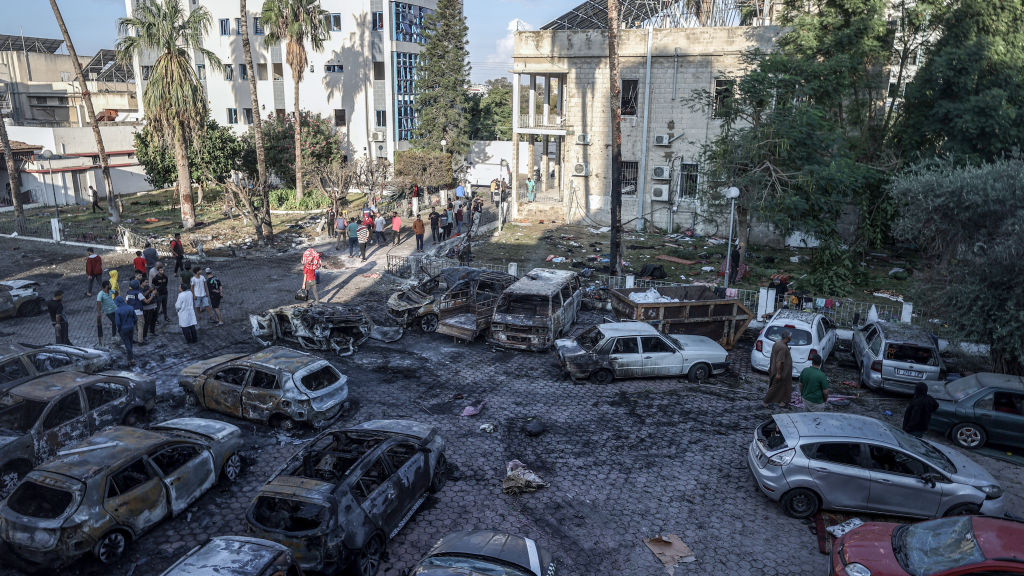Gaza hospital blast: What the video evidence shows about who's to blame
Nobody wants to take responsibility for the deadly explosion in the courtyard of Gaza's al-Ahli Hospital. Roll the tape.


A free daily email with the biggest news stories of the day – and the best features from TheWeek.com
You are now subscribed
Your newsletter sign-up was successful
Just before 7 p.m. on Tuesday in Gaza City, a fiery explosion erupted at the al-Ahli Hospital, leaving scores of Palestinian civilians dead. Hamas and the Hamas-run health ministry immediately claimed an Israeli airstrike destroyed the hospital, killing at least 500 people. Israel, after a brief investigation, said it was not responsible, blaming the blast on a failed Israel-bound rocket fired by a second militant group, Palestinian Islamic Jihad.
Neighboring Arab leaders blamed and denounced Israel, and outraged anti-Israel and anti-U.S. protests erupted across the Middle East.
By Wednesday morning, photos and video of the site appeared to show a small crater in the central parking lot of the lightly damaged hospital, surrounded by burned-out cars and a lawn strewn with scores of dead bodies.
The Week
Escape your echo chamber. Get the facts behind the news, plus analysis from multiple perspectives.

Sign up for The Week's Free Newsletters
From our morning news briefing to a weekly Good News Newsletter, get the best of The Week delivered directly to your inbox.
From our morning news briefing to a weekly Good News Newsletter, get the best of The Week delivered directly to your inbox.

The Gaza health ministry lowered its death toll to 471; the Israeli Defense Forces said Hamas was inflating the casualties. A doctor at the hospital, owned and run by the Anglican Church, said about 3,000 Palestinians had been crowded into the courtyard to escape Israel's bombing campaign; a local Anglican official told BBC that about 1,000 people were sheltering at the hospital at the time.
President Biden, the Senate Intelligence Committee, and the National Security Council said U.S. analyses of intelligence and open-source visual data pointed to a failed Palestinian rocket, not Israel, causing the blast. A Pentagon official told The New York Times the U.S. was "fairly confident" the failed rocket did not come from Israeli forces, but a lot remained unknown.
BBC's Verify unit examined available footage and spoke to several experts who agreed the damage "is not consistent with what you would expect from a typical Israeli airstrike with a large munition," though no definitive conclusions could be reached without an independent on-scene analysis.

CNN military analyst Mark Hertling explained how the evidence — small crater, intact buildings, conflagration from unused rocket fuel — was consistent with the failure of the kind of Iranian-supplied rockets used by Gaza militants.
A free daily email with the biggest news stories of the day – and the best features from TheWeek.com

Britain's Channel 4 News agreed that an Israeli airstrike did not fit the evidence, though it was more skeptical of Israel's explanation, noting inconsistencies and the IDF's past targeting of the hospital.
Marc Garalasco, a former military targeting analyst now at PAX Protection of Civilians, told PBS NewsHour that a failed Palestinian rocket was the most plausible explanation. But he also urged a ceasefire, noting that civilians were taking the brunt of the pain whenever either side attacked.

Peter has worked as a news and culture writer and editor at The Week since the site's launch in 2008. He covers politics, world affairs, religion and cultural currents. His journalism career began as a copy editor at a financial newswire and has included editorial positions at The New York Times Magazine, Facts on File, and Oregon State University.
-
 6 of the world’s most accessible destinations
6 of the world’s most accessible destinationsThe Week Recommends Experience all of Berlin, Singapore and Sydney
-
 How the FCC’s ‘equal time’ rule works
How the FCC’s ‘equal time’ rule worksIn the Spotlight The law is at the heart of the Colbert-CBS conflict
-
 What is the endgame in the DHS shutdown?
What is the endgame in the DHS shutdown?Today’s Big Question Democrats want to rein in ICE’s immigration crackdown
-
 Epstein files topple law CEO, roil UK government
Epstein files topple law CEO, roil UK governmentSpeed Read Peter Mandelson, Britain’s former ambassador to the US, is caught up in the scandal
-
 Iran and US prepare to meet after skirmishes
Iran and US prepare to meet after skirmishesSpeed Read The incident comes amid heightened tensions in the Middle East
-
 Israel retrieves final hostage’s body from Gaza
Israel retrieves final hostage’s body from GazaSpeed Read The 24-year-old police officer was killed during the initial Hamas attack
-
 China’s Xi targets top general in growing purge
China’s Xi targets top general in growing purgeSpeed Read Zhang Youxia is being investigated over ‘grave violations’ of the law
-
 Panama and Canada are negotiating over a crucial copper mine
Panama and Canada are negotiating over a crucial copper mineIn the Spotlight Panama is set to make a final decision on the mine this summer
-
 Why Greenland’s natural resources are nearly impossible to mine
Why Greenland’s natural resources are nearly impossible to mineThe Explainer The country’s natural landscape makes the task extremely difficult
-
 Iran cuts internet as protests escalate
Iran cuts internet as protests escalateSpeed Reada Government buildings across the country have been set on fire
-
 US nabs ‘shadow’ tanker claimed by Russia
US nabs ‘shadow’ tanker claimed by RussiaSpeed Read The ship was one of two vessels seized by the US military
